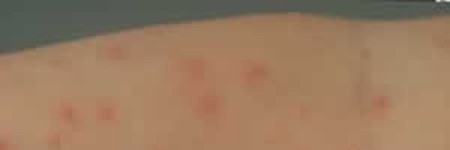Chickenpox
DEFINITION
Chickenpox is caused by a virus called the varicella-zoster
virus
virus
DESCRIPTION
- The incubation period (before the spots appear) is usually 10
to 21 days. - The symptoms are a slight fever, headache, fatigue and a loss
of appetite for a day or two before pink spots of various sizes
appear. The rash usually starts on the body, then progresses to
include the head and limbs. - Usually after 1 or 2 days, the pink spots turn into watery
blisters and begin to crust within 6 to 8 hours. - Chickenpox is contagious from about two days before the rash
appears until roughly five days after. - Chickenpox is spread by direct contact or by sneezing and
coughing. - The onset of Chickenpox is sudden. The ailment is very
contagious and a baby is highly susceptible from birth. - In severe cases, spots may cover the entire body. In most
cases, the upper trunk of the body is most affected and the body is
thought to resemble a plucked chicken. It is possible for ulcerated
lesions to appear on the upper respiratory tract and the walls of
the vagina and rectum. - If an adult contracts Chickenpox, the infection is usually more
severe than it is for children. Sometimes complications include
bronchitis and other medical conditions. It is very important that
your Doctor is consulted. - After a person recovers from this ailment, they are usually
immune for life from any other attacks. Epidemics of Chickenpox
occur every 3 to 4 years. This is the time period required to
develop a new group of susceptible children (children without
immunity). - It is possible that in later years, shingles may develop, as
the Chickenpox virus remains dormant in the body
TREATMENT OPTIONS
Always consult your Doctor for diagnosis and advice. In no way
is this information intended to replace the advice of a medical
practitioner.
is this information intended to replace the advice of a medical
practitioner.
- Discourage the patient from scratching, as this may encourage
infection and scarring. Keep fingernails short to avoid damaging
the skin. - Bathing often in mild soap and water and wearing clean
underclothing will reduce the risk of bacteria infecting the
Chickenpox sores. - Avoid excessive sun exposure at this time.
- Treatment is based on relieving symptoms.
- An antihistamine may help to relieve severe itching. Ask your
Pharmacist for advice. - Wet compresses may be applied to help relieve
itching. - Paracetamol can be used to lower a fever.
- Do not give aspirin to children under 16.
- Adults and newborns with Chickenpox are often sicker than
children. Their condition should be monitored to ensure that no
complications develop. If the patient is not better after
approximately 7 days, seek medical advice. - Children with Chickenpox should not attend school or daycare
for at least 5 days from the onset of blisters.
Aspirin should not be given to children under 16 years of age
unless specified by a Doctor.
unless specified by a Doctor.
DIET HINTS
- Maintain a healthy diet with a variety of nutritious foods
including wholegrains, beans, peas, fresh fruit and vegetables,
lean meats and low fat dairy products. - If appetite is poor soups, broths and fresh vegetable and fruit
juices are a good way to maintain calorie and nutrient intake. - Refined sugars are thought to inhibit the activity of the
immune system. Avoid foods and drinks with added sugars, including
soft drinks, fruit juices with added sugars, cordial etc. Pure
fruit juices should always be diluted 50% with water. - Drink at least 6-8 glasses of water per day.
PREVENTION
Prevention of Chickenpox is now possible, with vaccinations
available for children and adults. Vaccination is recommended
for:
available for children and adults. Vaccination is recommended
for:
- All healthy children over the age of nine months.
- Adults, particularly those at risk of infection. This includes
adults working in occupations where they are likely to be exposed
to the Chickenpox virus, such as child-carers, teachers and those
in other health care-related fields. - Parents of young children.
- People with no history of Chickenpox who live with
immuno-compromised patients such as HIV patients, cancer patients,
patients on immuno-suppressant medications.
Vaccinations are available from your Doctor.
VITAMINS/MINERALS/HERBS
- Vitamin A helps resist infection and is also an essential
nutrient for skin. - Vitamin C also supports the immune system and helps fight viral
infection. - Vitamin E helps prevent scarring of the skin.
- Echinacea to assist the immune system.
- Aloe vera may help relieve itching and assist the skin to
heal.
PHARMACIST’S ADVICE
Ask your Pharmacist for advice.
- Follow the Diet Hints.
- If you need any advice about how to take or how to apply any
prescribed medication, ask your Pharmacist. - Ask your Pharmacist for a product to control the itch. It is
suggested to first add a suitable medicated product from your
Pharmacy to a bath and soak for 20 minutes. Pat the skin dry and
then apply a product such as a gel recommended by your Pharmacist,
to help dry up the scabs. This should allow the skin to heal,
preventing scars. - If you need a pain-killer, paracetamol is one suggestion. Never
give aspirin to young children because of the possible side
effects. - Keep the patient as cool as possible.
- Rest is very important for the patient.
- Keep the fingernails trimmed and the hands clean to help stop
any scarring because that can be caused by scratching. - If the diet is considered inadequate, some nutritional
supplements might be considered. - A vaccine is available to protect against Chickenpox. Ask your
Pharmacist for details.
Aspirin should not be given to children under 16 years of age
unless specified by a Doctor.
unless specified by a Doctor.

